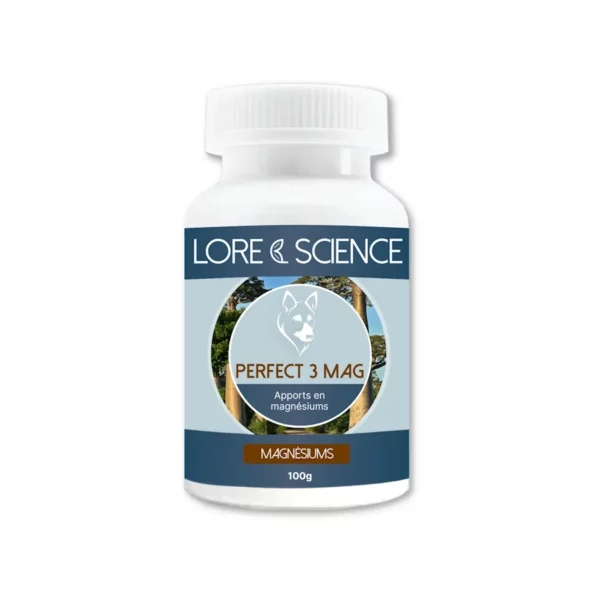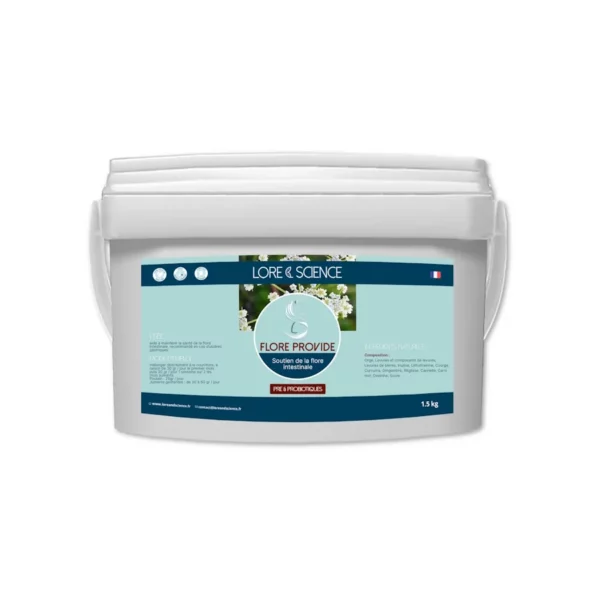As you already know, your dog is a carnivorous animal. However, although his nature leads him to feed mainly on meat, he needs much more to stay in top health. Among the many nutrients essential to his well-being, magnesium holds a special place. This often overlooked mineral is fundamental to the proper functioning of the body. Magnesium not only influences muscular and nervous capacities, but also plays a crucial role in stress management,improving recovery after exercise, and maintaining behavioral balance. In this article, Lore & Science explains why this mineral is essential to your dog's health, and how you can ensure he gets enough every day.
The role of magnesium in the dog's body
In dogs, as in humans, magnesium is essential for the proper functioning of muscles and nerves, regulating blood pressure and maintaining bone density. This mineral is also a cofactor in over 300 enzymatic reactions, which means it is necessary for the activation of various enzymes essential to survival.
One of magnesium's most important roles is in muscle support. It helps regulate muscle contractions and prevent cramps and spasms. In athletic dogs or those who exercise a lot, it is particularly crucial to ensure proper recovery after exertion. Adequate intake also helps prevent muscular rigidity and promotes flexibility. A real asset, especially for older dogs!
The effects of magnesium on behavior and stress
Just like humans, dogs can be subject to episodes of stress andanxiety, whether due to changes in their environment, loud noises such as thunderstorms or fireworks, or separation from their owners.Agitation,excessive barking, destruction of objects or digestive problems are all behaviors indicative of stress that you may have already noticed in your companion.
Magnesium helps regulate the production of cortisol, the stress hormone, and thus contributes to calming nervous reactions. It acts as a natural muscle and nervous system relaxant. As such, it moderates excessive reactions to stressful stimuli. As a result, an adequate intake of magnesium can promote more serene, balanced behavior in your dog.
Risks of magnesium deficiency in dogs
Unfortunately, magnesium deficiency is not uncommon in dogs, particularly due to inadequate diet or intestinal absorption problems. Signs of magnesium deficiency can vary, but generally include:
- muscle weakness
- tremors
- cramps
- lethargy
- behavioral problems (hyperexcitability or anxiety)
Dogs suffering from severe deficiencies can even develop more serious problems, such as convulsions or cardiac arrhythmias.
Growing puppies, pregnant or lactating females and sporting dogs are particularly vulnerable to magnesium deficiency. Similarly, older dogs or those suffering from certain chronic illnesses may be at risk of deficiency due to reduced intestinal absorption or disturbed metabolism.
The importance of a magnesium-rich diet
To prevent magnesium deficiency, it's essential to ensure that your dog's diet is balanced. Quality dog food is generally formulated to meet your pet's nutritional requirements, including magnesium. However, not all dog foods are created equal, and some diets may be insufficient to cover the specific needs of some dogs.
To top up your intake, you can add natural sources of magnesium to your companion's meals. These include green leafy vegetables, seeds, nuts, legumes and wholegrain cereals. You can also add natural supplements. Perfect 3 mag is a nutritional supplement specially formulated for sporting dogs and those prone to anxiety. This supplement is rich in three highly assimilable forms of magnesium, making it an invaluable ally in compensating for magnesium losses linked to intense physical effort. It contains natural 5HTP andarginine, recognized for their ability to enhance muscle recovery and reduce stress. The results observed are significant: improved recovery after exercise, reduced signs of stress, and greater resistance to hot weather.
Magnesium, an indispensable ally for your dog's health
Magnesium is a mineral of vital importance to your dog's well-being. This essential nutrient plays a multifaceted role in muscle support, post-exertion recovery and stress management. Its presence is essential to the proper functioning of the canine organism, and its absence can lead to physical and behavioral problems. Ensuring an adequate magnesium intake through a balanced diet and, if necessary, supplements will help prevent deficiencies and keep your companion in top health. Whether your dog is an accomplished athlete or simply prone to stress, investing in his health means offering him the best every day by your side.
Share your experience or questions with us in the comments ↓
















